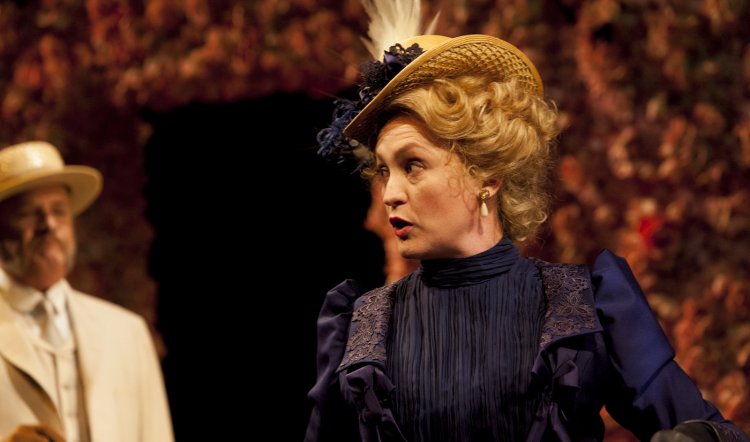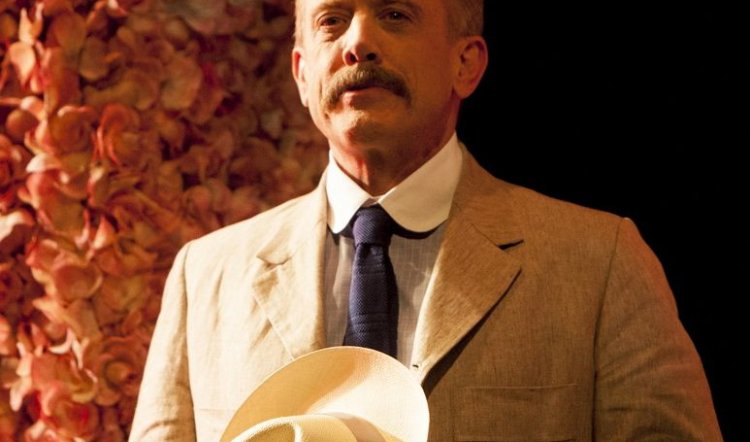
MRS WARRENS PROFESSION
MRS WARREN'S PROFESSION, Sydney Theatre Company in Wharf 1, 19 February-6 April; return season: 4-20 July 2013. Photos by Brett Boardman: above - Martin Jacobs and Helen Thomson; right: Simon Burke.
George Bernard Shaw's 1894 attack on polite society's morals and hypocrisy reflects its time and place of writing - the waning years of Victorian England. While Queen Victoria herself was the public face of rectitude and sanctimonious attitudes, the Prince of Wales - her son and heir - lived the louche life while waiting to become king. During his long years of doing little but have a good time he would undoubtedly have been one of Mrs Warren's regular clients - if her establishments had been situated in England and not on the Continent. It's simply what gentlemen did.
In placing Mrs Warren's brothels in Europe, however, Shaw did two things: for the plot he gave her a reason to be out of the country and out of her daughter's life for long periods; and also, in Shakespearean style, he avoided pointing the finger directly at English society - where such establishments were of course part of the landscape. But the smokescreen didn't work. The Lord Chamberlain (censor) recognised the play for what it was and refused a licence for performance. What it was - in the eyes of the ruling elite - was an unconscionably sympathetic portrayal of prostitution. Shaw's Mrs Warren was an independent businesswoman (gasp!) who used the male sense of sexual entitlement and their business methods and social mores to get on in life and prosper. Outrageous.
Mrs Warren's Profession is an acute political and social drama leavened with the playwright's characteristic sharp wit and humour. His eye is merciless and he skewers a representative of most English types and roasts them; the only character treated with compassion is the madam herself - the one whom society would scorn and shun. The honorific notwithstanding, Mrs Warren is also a single mother; her daughter Vivie was born out of wedlock, the father - apparently - unknown. A more scandalous heroine would be hard to imagine, the only moral shock missing is lesbianism and there's even a nod to that by the play's end!
As it is, Vivie (Lizzie Schebesta) is relaxing at her mama's country house after doing brilliantly at Cambridge and gradually it fills up as her mother (Helen Thomson) arrives along with a mixed bag of men. There's huntin', shootin', fishin' chum Sir George Crofts (Martin Jacobs), the foppish aesthete Mr Praed (Simon Burke), the socially overwhelmed local vicar, Rev Samuel Gardner (Drew Forsythe) and his rascal son and Vivie's beau Frank (Eamon Farren). Each is introduced in a neatly woven series of interactions and each is vividly drawn.
What is truly fascinating to the contemporary ear and eye is how Shaw lures in the unsuspecting audience to view each through social assumptions. Vivie is the clever young modern woman, all set to make her own way in the world although both Sir George and Frank are after her hand in marriage - the expectation being that she will, of course, marry. Praed is more Coward than coward in this particular tug-o'-war as he counsels Vivie, while the Rev Gardner is the innocent in this worldly set. And Kitty Warren is the one of whom one is obviously going to disapprove.
The playwright turns the tables quickly and sardonically, however, and the initial assumptions are shown to be both embarrassing and wrong. The hypocrite is not the morally reprehensible madam but her daughter and friends. Vivie has been happy to live off her mother's "immoral earnings" - the best schools, fine clothes and Cambridge and her own wish to make her own way in life - until she discovers that Mrs Warren is still involved in running her business and Sir George Crofts is her business partner. When her mother protests that in order to make a good life for her she had no choice, Vivie makes a marvellously priggish speech:
"Everybody has choices, mother," she declares. "The poorest girl alive may not be able to choose between being Queen of England or Principal of Newnham, but she can choose between rag-picking and flower selling, according to her taste. People are always blaming their circumstances for what they are. I don't believe in circumstances. The people who get on in this world are the people who get up and look for the circumstances they want, and, if they can't find them, make them."
Only a hugely privileged princess could say this with such a sense of entitlement; and to see her hectoring and dismissing her mother, even as she enjoys the life Mrs Warren's profession has given her, is quite shocking. Especially so because by then each of the men - save Praed - has revealed himself to be a moral midget beside the towering figure of the madam.
The performances are all first rate, under the politically and theatrically adept direction of Sarah Giles. She did a fine job late last year with the difficult Mariage Blanc and is clearly much more than "up and coming".

As the gentle but wily Praed, Simon Burke has rarely been better and anyone who is more familiar with him as a musical theatre performer should remember him as the protean Francis Bacon (The Three Furies) and be bowled over by his depth and versatility.
Martin Jacobs has no hesitation in thrusting himself into the excess of Victorian gentlemanly expectation. Sir George Crofts sees nothing wrong in marrying Vivie despite being old enough to be her grandfather - after all, he tells her - the age difference means she will be a rich young widow soon enough if only she will see sense now. It's a jovial exchange that captures the pragmatic foundations of the marriage business.
As the country parson, Drew Forsythe is a timidly bumbling figure and quite out of his depth among the men of the world. For so long now Forsythe has been cast as the rubber-faced clown of farce and comedy and it's good to see him revel in a more nuanced and subtle characterisation; his is a touching performance.
In contrast, as the younger Gardner, Eamon Farren is odiously good at the loose-limbed charm of the swanky young blade. It's hard to believe that Vivie will not quickly see that his energy and ambition are focused on leaving behind his father's parsonage; and that he is hellbent on marrying a fortune and she happens to be an heiress.
Lizzie Schebesta deftly manages the twists and turns of Vivie's emotional progress and she grows, visibly, from a somewhat gauche girl to a steely-minded young woman. As she spars with and steadily overcomes societal expectations - represented by the men - it's easy to see her mother's strength, but unsurprisingly, none of her wisdom and compassion.
The success of the play does depend on Mrs Warren however, and in Helen Thomson she becomes a stupendous figure; three-dimensional, intelligent, full-blooded and as true a character as Shaw could ever have wished for. Kitty Warren is a rich woman, she moves with practiced ease through the world she has made; sumptuously dressed and upright and formidable as a dreadnought. The invisible armour of her whalebone corsets means her body is as rigidly controlled as her emotions and her middle class voice. And so the cruel world is emphatically kept at bay by these means until - of all people - her own daughter manages to wound her.
In that awful moment Kitty Warren's collapse is instant and terrible. As her heart breaks so does the carapace she has so assiduously cultivated. The clipped tones of Oxford vanish as she reverts to the primal vowels and glottal stops of the Cockney girl she once was. Her body too, reveals her East End origins - gone is the elegant stance and physical control of the lady; instead, she sits, doubled over in her pain, knees splayed as she howls her grief and outrage at her daughter. Although she recovers her composure, something vital remains broken. It is a gut-wrenching vision of loneliness and betrayal and among her many recent fabulous performances, Thomson's Mrs Warren is simply magnificent.
Played in period costume on an uncluttered contemporary set, against a simple backdrop of sumptuous, old-fashioned rambling roses (wondrously lovely and smart design by Renee Mulder), Mrs Warren's Profession fulfils the basic but difficult wish that a production should treat the play and its characters as if newly-written and performed for the first time. It's a great achievement by the cast and creatives and is not to be missed.



